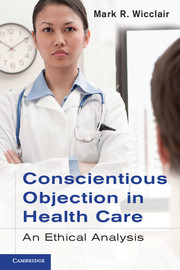Book contents
- Frontmatter
- Contents
- Preface
- 1 Introduction
- 2 Three approaches to conscientious objection in health care: conscience absolutism, the incompatibility thesis, and compromise
- 3 Ethical limitations on the exercise of conscience
- 4 Pharmacies, health care institutions, and conscientious objection
- 5 Students, residents, and conscience-based exemptions
- 6 Conscience clauses: too much and too little protection
- References
- Index
5 - Students, residents, and conscience-based exemptions
Published online by Cambridge University Press: 05 June 2012
- Frontmatter
- Contents
- Preface
- 1 Introduction
- 2 Three approaches to conscientious objection in health care: conscience absolutism, the incompatibility thesis, and compromise
- 3 Ethical limitations on the exercise of conscience
- 4 Pharmacies, health care institutions, and conscientious objection
- 5 Students, residents, and conscience-based exemptions
- 6 Conscience clauses: too much and too little protection
- References
- Index
Summary
Just as practitioners can object to providing services that are against their conscience, students and residents can have conscience-based objections to participating in educational activities. Among medical, nursing, and pharmacy students, the former have been in the forefront of efforts to secure exemptions from activities that violate their ethical or religious beliefs. Accordingly, their experience can serve as a model for students of nursing and pharmacy.
In 1996, the Medical Student Section of the American Medical Association (AMA) introduced a resolution calling on the AMA to adopt a policy in support of exemptions for students with ethical or religious objections. In that resolution, students identified abortion, sterilization, and procedures performed on animals as examples of activities that might prompt requests for conscience-based exemptions. In response to the student initiative, the Council on Medical Education (CME) recommended the adoption of seven “principles to guide exemption of medical students from activities based on conscience.” The House of Delegates adopted these principles in their entirety (AMA Policy H-295.896, “Conscience Clause: Final Report”).
Among residency programs, it is likely that obstetrics and gynecology programs generally have the most experience related to conscience-based exemptions. Although some family medicine residency programs provide abortion training, historically obstetrics and gynecology residency programs have been the primary providers of graduate medical training pertaining to performing abortions. Since abortion has been a primary target of conscience-based refusals in health care, it is to be expected that some obstetrics and gynecology residents have ethical or religious objections to abortion training.
- Type
- Chapter
- Information
- Conscientious Objection in Health CareAn Ethical Analysis, pp. 168 - 202Publisher: Cambridge University PressPrint publication year: 2011



